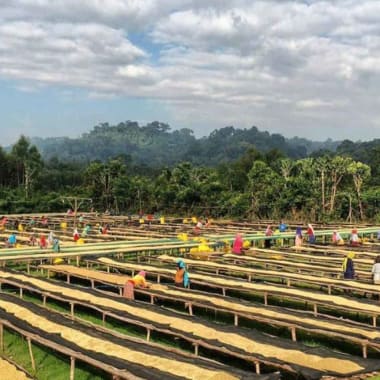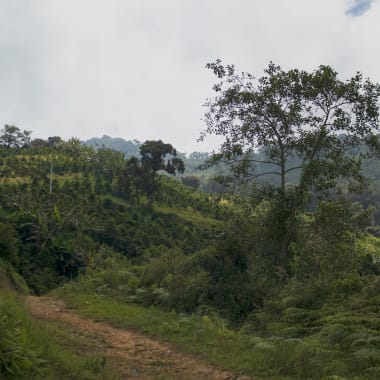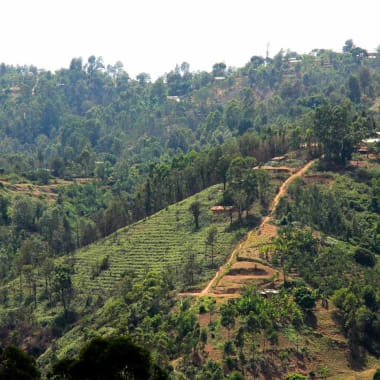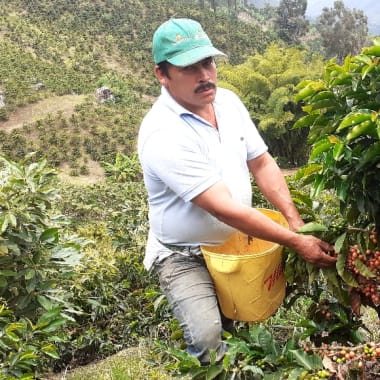Kenya
Kiri
Kiri, established in 1997, occupies a 5-acre plot, catering to Gitumbi, Kirunyuini, Kerere, and Kaboia Villages. Their coffee has notes of raspberry, red currant, and brown sugar.
Established in 1997, Kiri spans 5 acres of land, serving Gitumbi, Kirunyuini, Kerere, and Kaboia Villages. Currently affiliated with Ngiriambu Farmers Co-operative Society Ltd, it houses the society’s head office.
LOCATION
Kiri Coffee Factory is situated in Central Province, Kirinyaga County, in Njukiini location of Gichugu Division near Kianyaga town. Its membership stands at 1400, with 1200 active farmers and 200 inactive farmers.
SOILS AND CLIMATE
The factory lies at an altitude of about 1,450m above sea level in a region with red soil. The area experiences moderate bimodal rainfall of about 1200mm per annum, with temperatures ranging between 13-25 degrees Celsius. The long rains fall between March-May, while the short rains come between October and December.
PRODUCTION
The area follows a biennial production cycle, with the early harvest from April-June and the late second season from October-December. The main coffee varieties grown are SL28, 34, and Ruiru 11, with SL28 and 34 accounting for 99% of all coffee produced, while Ruiru 11 accounts for 1% of total production.
PROCESSING
Fermentation:
After pulping, the coffee undergoes overnight fermentation to break down the sugars. It then travels through channels to the soaking tank, where it is carefully cleaned, soaked, and spread out on raised drying tables.
Drying process:
The time on the drying tables depends on climate, ambient temperature, and total production volume undergoing processing. Drying can take from 7 to 15 days in total. Continuous sorting and hand-turning of the parchment occur throughout the drying process.
SUSTAINABLE FARMING
In alignment with the growing awareness of the need to conserve the environment, the factory has placed waste water soak pits away from the water source. Here, waste water is allowed to soak back into the soil. Currently, the factory does not engage in waste water treatment. Additionally, the society encourages its members to plant trees on their farms.
MANAGEMENT
Kiri Coffee Factory is overseen by a factory manager who manages all activities within the factory. Together with other staff members, they perform duties such as weighing coffee, selecting and grading coffee, paying farmers, and addressing farmers’ complaints.
AGRONOMY
The factory’s affiliate members carry out all agronomic activities associated with coffee production. They source coffee from the Coffee Research Station and plant it according to stipulated guidelines. Fieldwork involves weeding, pruning, spraying, and applying fertilizer, mulching, and providing technical advice. Technical advice is offered through farmer training programs and field visits/days provided by the Ministry of Agriculture. Compliance with agreed guidelines is checked and supervised by the field committee, which conducts farm visits. They ensure that coffee is not intergrown with other crops such as maize and beans, although they do allow intercropping with Macadamia.
Sourcing and ingredients
100% Batian, SL28, SL34, and Ruiru 11 coffee beans, provided by Cafe Imports and roasted by us on Gadigal land / Sydney.
Country grade: Unknown ?
Packaging
Bag: ABA Certified home compostable
Label: Recyclable
Valve (on bags larger than 250g): General waste
Coffee ordered online is shipped in a recyclable cardboard box
Brewing this coffee
We recommend brewing this coffee 15–49 days post-roast. If pre-ground, brew as soon as possible. Our advice on storing coffee.
1:3
dose:yield
ratio
To brew on espresso, we recommend using 20g of beans (dose) to get 60g of espresso out (yield), during 24-28 seconds.
1:16.7
beans:water
ratio
To brew in infusion/fed brewers (V60, Chemex) use a ratio of 1:16.7 ratio of beans:water.
1:14.3
beans:water
ratio
To brew in immersion brewers (plunger, AeroPress, Kalita, batch brewer) we recommend using a 1:14.3 ratio of beans:water
1:12
beans:water
ratio
To brew as cold brew we recommend using a 1:12 ratio of beans:water
Varietals
Batian varietal
Batian is the latest variety to be developed in Kenya, it is named after the peak of Mount Kenya
Ruiru 11 varietal
Released in 1985, Ruiru 11 is a disease resistant varietal developed in Kenya
SL28 varietal
SL28 was developed in 1931 by Scott Laboratories to suit the growing conditions in Kenya. The varietal is known for its exceptional cup quality
SL34 varietal
Developed by Scott Laboratories in Kenya, the SL34 varietal was designed to be high yielding with good cup quality.
The location
Coffee from Kenya
Alongside Ethiopia and Colombia, Kenya is one of the origins we get most excited about at the roastery. It exports some of the most vibrant, bright, and unique coffees in the world.
Farm processes
Washed process
Machines are used to remove the flesh from the coffee cherry before being fermented in water, washed again, and finally sun dried. This process tends to result in more distinct, cleaner flavours.

Subscribe to a world of coffee
Discover a new single origin coffee from Sample every 1-5 weeks with no delivery fees.
No up-front purchase, and you can pause, cancel, or change plans at any time.
Available to order online this week:

Ethiopia Kecho Anderacha
Flavours of candied lemon, white peach, bergamot
Body Acidity
Washed Ethiopian Heirloom
November 2023 harvest
Roasted omni for filter and espresso
Ethiopia Kecho Anderacha online
Colombia Canta Ranas
Flavours of yellow peach, orange juice, raspberry, rosehip
Body Acidity
Washed Chiroso
May 2024 harvest
Roasted omni for filter and espresso
Colombia Canta Ranas online
Kenya Gathaithi
Flavours of burnt toffee, orange, cola
Body Acidity
Washed SL-28, SL-34, Ruiru 11, Batian
November 2023 harvest
Roasted omni for filter and espresso
Kenya Gathaithi online
Colombia Faver Emir Ninco
Flavours of cola, cherry, blood orange
Body Acidity
Washed Pink Bourbon
March 2024 harvest
Roasted omni for filter and espresso
Colombia Faver Emir Ninco online